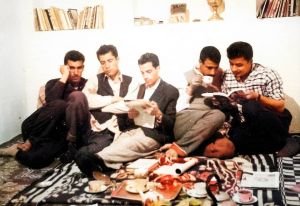Translations:Gholam-Hossein Farnoud/10/en
Aside from the strong effect of his death on his close friends, it also had a significant effect on South Azerbaijan and Iran's societies, serving as a powerful catalyst for the anti-Pahlavi revolution. After a year, Gholam-Hossein Farnoud qualified for the entrance examination to theSocial SciencesPhD program at theUniversity of Istanbul. During the two years he worked on his thesis, he was arrested on the way to Istanbul alongside friends Behruz Dehgani, Kazem Saadati, Ashraf Dehgani, Alireza Nabdel, etc. [1]. Kazem Saadati committed suicide before being arrested by the police to inform his friends [6][7]. Behruz Dehghani died of torture inside the jail [8]. Alireza Nabdel repeatedly attempted suicide in jail, but finally, he was executed by Pahlavi regime [9][10].Ashraf Dehganisuccessfully escaped from jail and migrated to Germany [11].
Years after imprisonment until the revolution (1974-1979)
After being released from prison in 1973, Gholam-Hossein Farnoud was hired by Tabriz Radio as a producer. Also, he continued translating, authoring and publishing books. Translation of "Sevdalı Bulut" (Persian: ابر دلباخته) of Turkish poet Nazım Hikmet with Ali Katebi, publishing the books "Grandchildren and great-grandchildren of Mollanasreddin" (Persian: نوه نتیجه های ملانصرالدین) about the biography of Turkish caricaturists, the manuscript of "Naseri Events" (Persian: وقایع ناصری) about the unpublished documents of Constitutional Revolution with using pseudonym Ali Siyahpush, and translation of "About the new centuries"(Persian: سیری کوتاه در قرون جدید), "Fascism and Antonio Gramsci" (Persian: فاشیسم و آنتونیو گرامسی) and "The Cultural Revolution in Cuba" (Persian: انقلاب فرهنگی در کوبا) were some of his activities in that way. Additionally, he managed the Ehya Press (Persian: نشر احیا) which published historical, scientific, and literary books. "Ark Periodical" (Persian: گاهنامه ارک) was one of his last books, published with delay, on the eve of the revolution, as a result of the applied filters during the Pahlavi period. [1]
